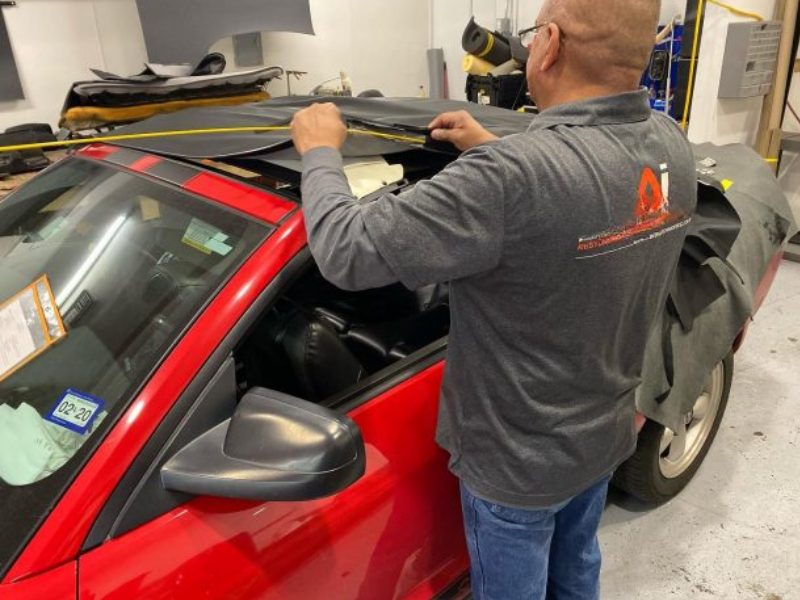Last Updated on October 6, 2023 by Matthew Lloyd
If you own a car with advanced safety features, you might have heard of the Forward Collision Warning (FCW) system. As the name suggests, this technology warns drivers about potential forward collisions and helps prevent accidents. However, if the FCW sensor gets dirty or obstructed, it can significantly reduce effectiveness and even cause false alarms. Here, we will discuss cleaning the FCW sensor properly to ensure your car’s safety features work correctly.
What Is FCW Sensor?

The Forward Collision Warning (FCW) sensor is vital to modern cars’ safety systems. It uses radar, lasers, or cameras to detect objects in front of the car and alert the driver if there’s a potential collision. If the system detects an imminent crash, it can apply brakes or reduce speed to avoid impact.
How To Clean FCW Sensors?

Step 1: Locate The Sensor

In most vehicles, the sensor is behind the front grille or bumper. However, some manufacturers may place it differently, and your owner’s manual should have details specific to your car.
Step 2: Prepare the Cleaning Solution:
Mix a small amount of car shampoo with lukewarm water in a bucket. Read your chosen car shampoo instructions, as some may require specific dilution ratios. Use a clean cloth or sponge to stir the mixture until it becomes soapy. Do not use hot water, as this could damage delicate components within the sensor.
Step 3: Apply The Cleaning Solution

Spray a great cleaning solution onto a lint-free cloth or microfiber towel. Ensure the cloth is damp but not soaking wet with a cleaning solution. Gently wipe down the FCW sensor using circular motions. Be careful not to apply too much pressure, which may damage or scratch the sensor’s surface. If there are any hard-to-reach areas, use a cotton swab dipped in the cleaning solution to clean them.
Step 4: Clean With Clear Water

Using a spray bottle or hose, gently rinse off the sensor and surrounding area until no visible soap suds or residue remains. Don’t use high-pressure water, as this can damage delicate parts of the sensor. Once rinsed, dry the area thoroughly with a clean microfiber towel or compressed air. A damp environment can lead to further dirt accumulation and potentially affect the accuracy of your FCW system.
Causes Of FCW System Failure
Dirty Or Obstructed Sensor:

This can happen when dirt, debris, or other materials accumulate on the sensor over time. When this happens, the system may not be able to accurately detect obstacles in front of the vehicle and issue warnings or apply brakes as needed.
Malfunctioning Sensor:

Over time, sensors can become damaged or worn out due to exposure to extreme weather conditions, collisions, or other factors. If the sensor is not working properly, it may not be able to detect obstacles in front of the vehicle and issue warnings or apply brakes as needed.
Electrical Issues:

Electrical issues can also lead to FCW system failure. For example, suppose there is a problem with the wiring that connects the sensor to other parts of the car’s electrical system. In that case, this could prevent accurate detection and warning systems from functioning correctly.
Harsh Weather

In harsh weather conditions such as heavy rain or snowstorms, FCW sensors can get covered by dirt and debris, which could limit their ability to function correctly.
How Do FCW Sensors Work?

FCW sensors, also known as forward collision warning sensors, use a combination of radar and cameras to detect potential collisions with obstacles or other vehicles. The system works by constantly scanning the road ahead and measuring the distance between the vehicle and any objects in its path. If the sensors detect an object too close to the vehicle, they will alert the driver with visual and audible warnings.
Can I Clean Car Sensors With WD40?

It is not recommended to clean car sensors with WD40, including the FCW (Forward Collision Warning) sensor. While WD40 might be a quick solution for cleaning dirt and grime from your car’s sensors, it can cause more harm than good. The reason is that the chemicals in WD40 can damage sensitive electronic components, leading to costly repairs.
Instead of using WD40, it’s best to use a specialized cleaner designed specifically for cleaning car sensors. Many types, such as contact or electrical cleaners, are available on the market. These cleaners are much safer and gentler on sensitive electronics than WD40.
What Types Of Objects Can Your Forward Collision Warning System Detect?

The FCW system can detect various objects, such as other vehicles, pedestrians, animals, bicycles, and stationary obstacles like road signs or barriers. The sensors use advanced algorithms to analyze the object’s speed, size, distance from the vehicle, and trajectory to determine if it poses a threat. The system then calculates the risk of a collision and warns the driver with visual or auditory cues.
What Is Forward Collision Warning Distance?

Most FCW systems can detect objects up to 500 feet from the vehicle. The system uses radar or cameras mounted on the front of the car that continuously scans ahead for any obstacles that could cause a collision.
Conclusion
Cleaning the FCW sensor is a crucial step in maintaining vehicle safety. Regular cleaning helps to ensure that the sensor can function correctly and provide accurate information to the vehicle’s computer. Cleaning the FCW sensor is relatively simple and can be done at home with minimal tools. If the FCW system continues to malfunction after cleaning, taking your vehicle to a professional mechanic may be necessary. They will be able to diagnose any underlying issues that could be causing problems with the system. Additionally, always follow manufacturer guidelines for maintaining your vehicle’s safety features, including scheduling regular maintenance appointments and promptly addressing warning lights or messages.

